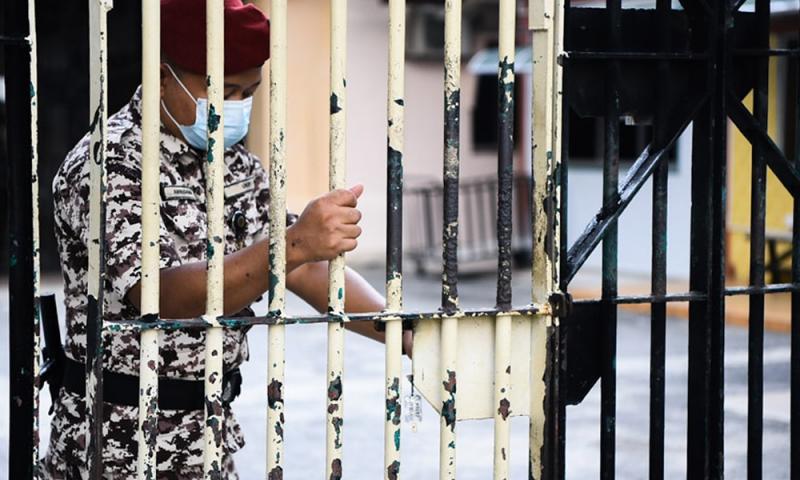LETTER | Custodial deaths: Govt must review policing system
LETTER | Yesterday (July 5), 125 inmates filed a petition while in detention over alleged abuse of powers by prison wardens in Jelebu prison in Negeri Sembilan.
Sadly, the lawyers for the detainees admitted that this was not the first time a petition of such nature was submitted to the Ministry of Home Affairs and the Prisons Department.
In the petition, there were allegations of detainees being beaten by PVC pipes, punished inhumanely for talking, denied proper access to water for bathing and praying, and other unacceptable treatment.
This happens when Malaysia passed the Independent Police Conduct Commission (IPCC) and committed itself to look into prison reform.
Unfortunately, for more than 60 years, beatings and inhumane treatment of prisoners seemed to be the standard operation procedure (SOP) – and the offending officers get off with impunity.
Below are some of the cases as stark reminders of why reforms in the policing system have to happen.
May 1, 2021
22 inmates at the Jelebu prison in Negeri Sembilan urged the government to take action against any officers at the jail who were involved in alleged abuse of detainees.
They alleged physical abuses including chilli powder sprayed on their private parts, deprived access to water, and others.
Feb 24, 2021
A Ganapathy, a 40-year-old trader who sold cow’s milk, was arrested.
According to the family lawyer, Ganesh, there were witnesses who claimed they saw Ganapathy brutally assaulted while in custody, hit by a rubber hose and forcibly dragged across a road.
On March 11, he suffered severe injuries and his leg was amputated.
April 18, he died.
June 21, 2021
A 25-year-old named Roopan Karnagaran died in Kajang prison, Selangor. There were allegations of major inconsistencies between accounts from doctors and prison officials.
July 30, 2018
A Malaysian immigration officer’s physical assault on a foreign national was captured on a mobile phone in Johor Bahru near the Singapore border.
After the video went viral on social media in early June, it was reported the officer was suspended and would probably lose his job.
The above cases are just the tip of the iceberg.
Deaths piling up
When a question was raised in the March 2023 parliamentary sitting for an update on the government’s investigation on the condition of 150 migrants at detention centres, Home Minister Saifuddin Nasution Ismail replied in a written response that seven children and 25 women were among those who died in detention in 2022.
From January–September 2019, Suhakam reported that 15 persons died in police lockups and prison, while over 55 died in immigration detention centres.
In March 2017, in response to a parliamentary question, the home minister stated that 1,654 cases of death in custody were recorded in Malaysia between 2010 and February 2017.
Between 2010 and February 2018, Suaram reported that only nine police officers were charged in court for negligence or causing injuries or deaths. Two were convicted for minor offences while the rest were acquitted.
In February 2016, six men who were detained under Sosma sent letters to Suara Rakyat Malaysia (Suaram) reporting alleged cruel and inhumane treatment.
Some may feel the police are doing well in their crime-busting jobs and we even have a film to promote the dedication of the police force.
There is no question about the commitment of our law enforcers, be it PDRM, immigration or customs, to crime fighting and ending terrorism. As citizens, we thank them for that but there are too many cases of abuse that we need to take cognisance of.
Presently, Malaysia’s record of deaths in custody is poor with the Immigration Department holding the most deaths in custody for 2022, with 150 deaths; while the police have 11 and the Prisons Department nine.
The lives of alleged criminals or even terrorists, are not worthless. They must be brought to open courts. The data in front of us is worrying as it shows that for more than 60 years, reforms have not been forthcoming.
Govt must act
Malaysia is an elected member of the UN Human Rights Council and this responsibility is a testament to the international community’s recognition and confidence in the country’s endeavours as a consensus builder and facilitator towards the advancement of human rights.
Prime Minister Anwar Ibrahim has even asserted, in an interview with Al Jazeera, that “all of them [unity government] agree that this country will go to the dogs if you do not take measures to change now.”
There are now opportunities to do the right thing under the Unity Government that pledges to take steps to change and I sincerely hope that this includes police and prison reforms.
Some immediate actions that could be taken are as follows:
Reviewing the Independent Police Conduct Commission (IPCC) independent oversight body so that it is:
impartial from the State and the police, to avoid a conflict of interests;
empowered to investigate and have disciplinary jurisdiction powers against police officers responsible for serious abuses; and
able to protect whistle-blowers so they will not be penalised or intimidated
2. Reviewing the existing plan on prison reforms with the Prison Department, PDRM, relevant agencies, and civil societies.
3. Empowering the Enforcement Agency Integrity Commission (EAIC) to ensure the effective and accountable implementation of the plan of action will be applied to all enforcement agencies under its purview. Increasing budget allocation in the coming Budget 2024 to ensure the above reforms can be implemented effectively.
4. Strengthening MACC as an independent institution to curb corruption.
I believe the above steps are not impossible to undertake and can be done within one to two years.
The solution does not lie in giving impunity to the offenders. We have to address corruption, abuse of power, governance of the administration, the income of officers and their welfare needs – all rolled into one so that we protect the name of our police force and national security.
Revamping policing system
Indeed we need to re-invent policing to introduce core values into the policing systems by focusing on respect for humanity, rehabilitation, and re-education for law enforcers.
An important element of change that needs to be considered is that when officers retire and with youth from Generation Z and beyond entering into these occupations, their different expectations and experiences have to be accounted for.
The youth may be more tech-savvy but also have higher income expectations, enjoy greater freedom, and want more challenging job scopes.
This is where data and technology can and are already changing the very nature of the policing system.
The collection of “hard” evidence is shortened with digital traces left behind by criminals. The nature of recruitment changes to not only having more officers with skills on the street but also those capable of working in the back and middle office as IT and investigative specialists.
Moving with the times and changing labour needs and skills is essential in building a much more resilient, responsive policing system. The change is now and not in 10 years’ time.
The views expressed here are those of the author/contributor and do not necessarily represent the views of Malaysiakini.
RM12.50 / month
- Unlimited access to award-winning journalism
- Comment and share your opinions on all our articles
- Gift interesting stories to your friends
- Tax deductable

 Maria Chin Abdullah
Maria Chin Abdullah